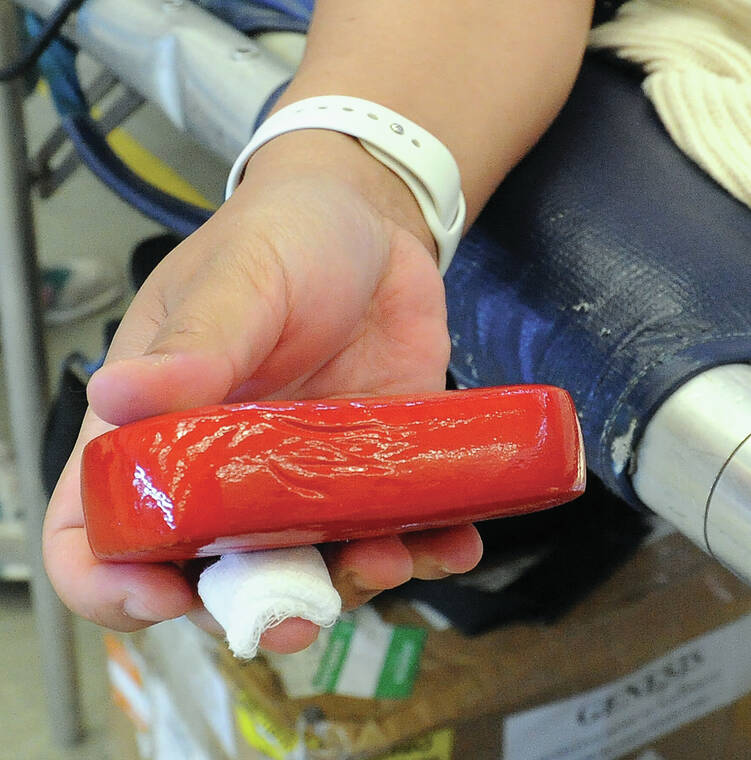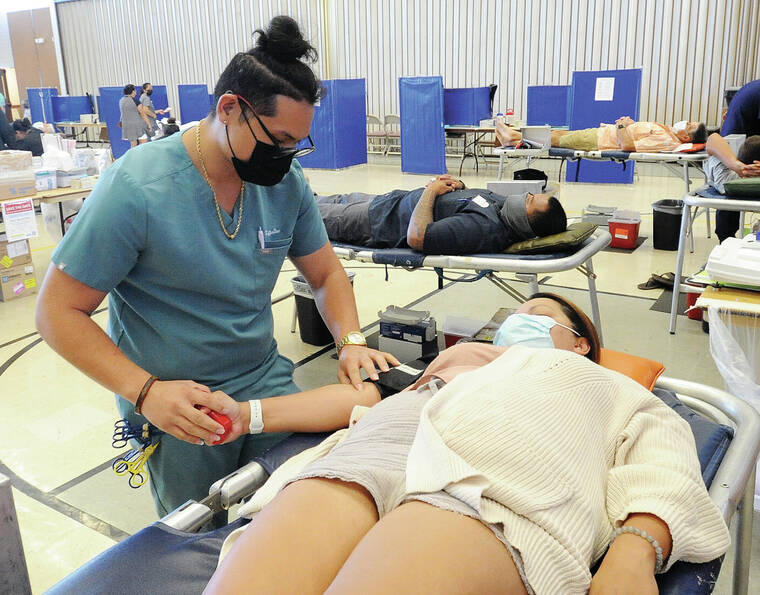The Food Basket, Hawaii Island’s lone food bank, was able to distribute 437 meals to hungry Big Islanders thanks to blood donors in the community and a partnership with Blood Bank of Hawaii.
Hawaii’s only blood bank donated one meal for every blood donation collected during a three-day drive held in January in Hilo as part of its “Give Blood. Eng Hunger” campaign. On Thursday, Blood Bank of Hawaii presented a “check” to The Food Basket at its Kona blood drive that attracted hundreds ready to give the gift of life.
“Neighbor Island donors rose to the opportunity of helping their community beyond a blood donation,” said Justin Martin, Blood Bank of Hawaii’s marketing manager. “With the help of donors who joined us in Hilo, we were able to provide 437 meals to Hawaii Food Basket.”
The “Give Blood. End Hunger” campaign, aimed to make blood donations go further by providing a meal to Hawaii Foodbank. After a successful launch in December on Kauai and Oahu, the campaign was extended through January, National Blood Donor Month, during which the Hilo event was held benefiting The Food Basket
The campaign resulted in 9,593 meals to various food banks across the state, said Martin.
“I love the whole concept of partnering with another nonprofit,” said Kristin Frost Albrecht, The Food Basket’s executive director. “Especially this time of year, when we go into a dip in donations.”
The three-day blood drive that ended Thursday in Kona was the fifth held on the island’s west side since the onset of the COVID-19 pandemic in spring 2020. The Blood Bank of Hawaii suspended neighbor island drives in April 2020, although drives continued on Oahu to provide the state with blood and blood products. The organization resumed drives on the neighbor islands in October 2020, but they are only held every four months.
February’s three-day drive, held at The Church of Jesus Christ of Latter-day Saints Kona Stake Hall, drew 500 registrations, maxing out capacity for the event.
Martin said organization’s goal is 150 to 200 donations per day. While the blood bank had some months missing that target during the pandemic, goals were met in January and appear things appear to be on pace to meet goals this month.
O negative blood are most in demand.
“If a trauma occurs, and blood is needed, O negative is a universal donor. It can be given before blood has been typed,” he said. “Only 3% of the population in Hawaii has O negative.”
Kona resident Katie Mikelson donated at Thursday’s drive.
“I have O negative, so I feel like it is my duty to donate,” she said. “I can save everybody, but not everybody can save me.”
She said three of her children share her blood type and hopes to be an example to them.
“I know there is a need. I do what I can for my community,” she added.
Other than whole blood donations, plasma and platelets are also collected, although only at select locations throughout the state.
“Every donation can save three lives,” Martin said. “That helps with inventory as well as maximizing people’s donations.”
Persons with AB blood types are universal donors for plasma, which helps treat bleeding disorders, liver disease, and several types of cancer, among other conditions like immune deficiencies.
Thursday was the first time Sara Kobayashi donated blood.
“A friend of mine was on social media saying she was going to donate. I’ve always wanted to do it, especially after seeing last year’s shortages,” she said. “I wanted to but I didn’t know how to start.”
She checked the Blood Bank’s website, saw the schedule and signed up. Kobayashi plans to become a regular donor.
Martin said proof of vaccination is not required to give blood as long as an individual is asymptomatic. If someone has tested positive for the coronavirus, the donation must come 28 days after they last exhibited symptoms.
The next blood drives on the Big Island are scheduled for May 17-20 in Hilo and June 21-23 in Kona.
“Just do it,” encouraged Kobayashi.
For more information or to make reservations for the next drive, visit bbh.org or call (808) 848-4770


